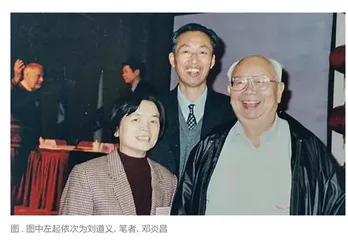In Memory of Frank Tang
作者: 叶在田

摘 要:对于从20世纪90年代走来的英语教师而言,邓炎昌先生(英文名Frank Tang, 1923—2020)是一位声望卓著的英语界前辈。邓先生生前担任高级顾问,负责人民教育出版社与朗文出版社联合出版的新教材的终审工作。邓先生与刘道义教授团队一道,为保证新教材质量上乘、语言地道鞠躬尽瘁。本文介绍了邓炎昌先生的一生、他所取得的成就、他的个性以及他对祖国的一腔赤诚,以此缅怀。
关键词:邓炎昌;文化交流;英语教师
A Pioneer in Cultural Exchange
Frank Tang (1923—2020) is remembered as a pioneer who has made remarkable achievements in the cultural exchange between America and China. Throughout his career, he was dedicated to discovering differences between the two cultures and, especially, the two languages, sparing no efforts to remind fellow scholars as well as his students of the importance of cultural and linguistic differences in communication from the Chinese language to English, and vice versa.
Some of the ideas or notions in Chinese seem so commonly used in everyday life, yet when translated into English, they would most likely cause misunderstanding or embarrassment on the part of the listener. The Chinese phrase “你辛苦了”, for example, is an expression often used to convey thanks to someone who has done the speaker a favor or a good turn. However, the expression shouldn’t be literally translated as “You are tired”. And similarly, “你吃饭了没有? ” shouldn’t be translated as “Have you had your meal?” as a way of greeting someone. Instead, we should say “How are you?” in the latter example, and “Thank you” in the former.
As a native speaker of English, Tang was aware of his advantages as a Chinese-American scholar, and he took on himself the role of an educator seriously, seizing every opportunity to make cultural and linguistic observations and comparisons. His book American Society and Culture was well received by Chinese scholars and students, and Language and Culture, a book he co-authored with Prof. Liu Runqing, has seen as many as 30 print runs since its first publication by the Commercial Press.
A Keen Explorer in English Language Teaching
Professor Tang was always very keen on exploring new ways of teaching English in the Chinese classroom. When he first began to teach at Beijing Foreign Languages Institute (now known as Beijing Foreign Studies University), he found that the teaching methods were somewhat awkward, especially in the freshman stage. Students were asked to analyze each sentence in a passage of 3 to 4 pages. They also had to make as many sentences as possible based on the text they were reading. They were required to study every word intensively they came across. This “Intensive Reading” method in his eyes seemed to be unproductive and inefficient. From his perspective, this could hardly suit the beginners in their acquisition of the English language.
Professor Tang believed that language learning should start with listening time and again to a simple language topic until the learners could generally understand the meaning. And then, the learners could go on to try to recount what they had listened to without thinking much of grammar rules, or being afraid of making grammar mistakes. This idea of his later materialized into an academically approved approach called the audio-lingual method, and it has profoundly promoted the teaching efficiency, and greatly built up the confidence in English learners. In fact, Professor Tang was himself a practitioner of new ideas in teaching methodology. His years of hard work yielded another two works English Conversation and 50 Everyday Topics in English, both being very popular among English major students and general readers motivated toward English learning.
A True Patriot
Professor Tang is saluted as a true patriot. Shortly after graduating from South California University, young Frank returned to China in 1948. After three years of study in Yenching University, he was actively engaged in the reconstruction of China, his motherland. He was never hesitant to devote himself to the English language education in China. Even during the 1960s when Professor Tang was suspected of being an American spy, he was looking forward with optimism. Even in those years, he never regretted his big decision to serve his own country. A worn-out man that he seemed to be in those days, he remained faithful to his motherland and hopeful for the future.
Professor Tang was friends with many foreign professors and kept a good relationship with the US Embassy in China. However, he never became attached to any political party, preferring to keep his distance and individuality intact throughout. With absolute trust and sacred duty to the motherland he adored, he would always cherish in his mind a good wish of seeing his country become better. But few people knew that behind all Professor Tang’s success and hardship stood a woman who gave her heart to the man she married.
A Family Man
Indeed, just as Professor Tang once said, “Without the love from her family, without the aid of the hospital where she was working, and above all, without her devotion, my life wouldn’t have been so happy.” It was at a student party that young Frank got to know Miss Huang Yiya, a pretty and kind-hearted nurse in Beijing Tongren Hospital. She fell in love with him, married him, and became a mother of two children (Deng Ying the daughter and Deng Gang the son). She was a loving companion to Tang for over 70 years. In Tang’s eyes, she had been an angel with a heart of gold, who took good care of his everyday life, understanding and supporting him all along, even though in times of hardship.